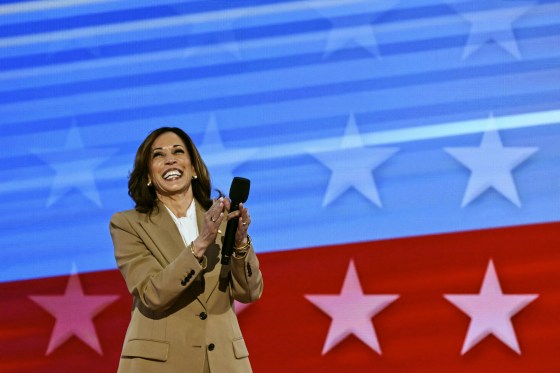CHICAGO — Kamala Harris is slowly unveiling a policy agenda for next year if she wins the presidency. The ensuing debate is highlighting an important dynamic: She’ll need Democrats to win control of both chambers of Congress for many of her biggest ambitions to have a fighting chance.
There is little in Harris' agenda that can be achieved by executive action — and any attempts would most likely get tied up in court. And Republicans are already telegraphing that if they control either the House or the Senate under a Harris presidency, her early plans would be dead on arrival.
“What we really need to do is to win the trifecta,” Sen. Sheldon Whitehouse, D-R.I., said at a recent fundraiser with Minnesota Gov. Tim Walz, the Democratic vice presidential nominee. “Because if President Harris has to contend with MAGA crazies in the House or mischief makers in the Senate, it’s going to be a very different Harris presidency. We need to win the trifecta.”
That’s a tall order: Democrats have a 51-seat Senate majority, but the party is set to lose a seat in West Virginia, and Democratic senators are locked in difficult campaigns for re-election in two more Trump-friendly states, Montana and Ohio. In the House, Democrats need to net four seats to take control.
Yet there’s a lot that Harris could do with Democratic majorities in the House and the Senate, even narrow ones, because of Senate rules that mean policies dealing with spending and taxes could bypass the 60-vote filibuster rule.
They could include Harris’ plan to grant a $3,600-per-child tax credit for middle-class parents, extend Affordable Care Act subsidies and extend the Earned Income Tax Credit by up to $1,500 for “front-line” workers. That filibuster-proof process could also be used to approve her proposal to fund billions of dollars in subsidies for local governments to build more housing and offer $25,000 to first-time homeowners.
And the same 50-vote process can be used to raise tax revenues to finance those plans, including her call for raising the corporate tax rate from 21% to 28%.
But securing full control of Congress to give the plan a vote will be difficult even if Democrats have a strong year.
“Forty-nine versus 50 is the difference between an historic legislative agenda and total gridlock,” said Ezra Levin, a co-founder of the progressive advocacy group Indivisible. “Impossible to codify abortion rights. Impossible to pass democracy reform. And any economic legislation will be vulnerable to a GOP veto. We need 50 votes.”
Harris’ plans would need to be modified to win the votes in Congress. But a Democratic-led Congress would be invested in her success and give her ideas a hearing.
Meanwhile, Republican House Speaker Mike Johnson, of Louisiana, has excoriated the new Harris proposals as “massive, big-government socialist policies” and compared them to laws in “Soviet Russia and Venezuela.”
“The Harris plan is the opposite of what our country needs, and it should be soundly rejected,” Johnson said in a statement.
And former President Donald Trump, who is likely to remain influential with the GOP even if he loses the election, is fiercely criticizing her ideas.
"Comrade Kamala is going full blown Communist," Trump campaign spokeswoman Karoline Leavitt said by text message.
Other Harris proposals that are regulatory would be subject to the Senate’s 60-vote threshold.
They include her plan to “cut red tape and needless bureaucracy” to streamline the process of building homes. They also include bills Harris has endorsed to stop “predatory investing” by corporate homebuyers. And they include her call to give the Federal Trade Commission and state prosecutors new powers to crack down on price gouging by companies on food and groceries.
If Democrats end up with 50 votes, they would have a path to pierce the filibuster for at least some of their ambitions, like codifying abortion rights and expanding voting rights. Outgoing President Joe Biden has endorsed filibuster exceptions for those two measures, but not others.
Harris’ current position on the filibuster is unclear. During her failed 2020 presidential campaign, she called for abolishing it to pass aggressive new policies. But she has been quiet about it in this race. Her campaign didn’t comment when asked whether she favors piercing the 60-vote filibuster and, if so, for what policies.
The chasm between the two parties emphasizes the importance of the battle for Congress. Every president since 1992 has entered office with his party controlling both the House and the Senate.
The looming expiration of parts of Trump's 2017 tax law by the end of 2025 could provide an opening for bipartisan negotiation over new tax policy, even if there is divided government. But that would look very different from Harris’ pushing her proposals with party control.
Still, some Democrats aren’t giving up hope that Harris could advance parts of her agenda without a full trifecta.
“The really big stuff requires at least a Democratic majority in one chamber of Congress to negotiate with the other chamber,” said Mondaire Jones, who is challenging Rep. Mike Lawler, R-N.Y., in a competitive suburban district. “I think we’re going to have both chambers. ... The energy that we’ve seen over the last four weeks is a testament to how we’re going to defy expectations.”
Sen. Michael Bennet, D-Colo., said his party was “facing a potential landslide” victory by Republicans before Biden dropped out.
But now, he predicts that Democrats will “surprise people” and win the trifecta. And if they do, he said, “we’re going to be able to do some really important things, like pass a child tax credit bill that will cut childhood poverty in half.”

